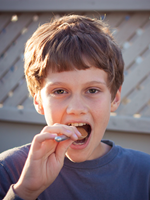Dangerous trend - challenges on the net
In the context of ever new challenges and dare games, the mostly young participants are asked to complete embarrassing or sometimes extremely risky tasks. In this context, it is not unusual for young people to enjoy experimenting or taking on challenges. What is new is that on social networks such contests are public and achieve a wide reach. The videos are shared many times and friends can also be publicly nominated to participate in the challenges. Perhaps funny at first, such contests can also have serious consequences.
Internet challenges - examples
The "ALS Ice Bucket" Challenge was the first challenge to become a viral phenomenon in 2014. The challenge consisted of pouring a bucket of cold water over one's head and then nominating three people to also take on the challenge within 24 hours. The performance and nomination were filmed and uploaded to YouTube or sent to friends via WhatsApp or Facebook. Tens of thousands, including Mark Zuckerberg and Bill Gates, joined in. Those who did not accept the challenge were asked to donate 100 euros/US dollars to the ALS Association for research into the nerve disease amyotrophic lateral sclerosis (ALS).
Other challenges subsequently hit the headlines because they were associated with health risks, some of them considerable:
The task of the "Cinnamon Challenge," for example, was to swallow a teaspoonful of cinnamon and film oneself doing so. For some participants in the challenge, the cinnamon triggered allergic reactions. Others suffered from severe breathing problems and even choking.
In the "Salt and Ice Challenge", an ice cube was to be placed on the skin together with a pinch of salt. The chemical reaction led to severe cold burns on the skin of many participants.
Internet challenges - a modern form of tests of courage
Tests of courage are part of the developmental risk behavior of many young people - this was already the case in offline times. The main aim of the young participants is to prove something to themselves by overcoming subjectively experienced unpleasant feelings, to set themselves apart from their parents and to gain recognition within their peer group. It is important to talk openly with young people about the risks of such challenges and to encourage them to question the actions critically.
Self-harm as a trend?
The presentation of self-harming behavior is widespread on the net. Slicing, snipping or cutting are even glorified as a lifestyle in some communities (source: Annual Report 2015, jugendschutz.net). Images of burns, scars or bleeding wounds can lower inhibition thresholds among young people and stimulate harmful behavior. Problematic challenges could also be observed in the area of eating disorders. For example, adolescents challenge each other to dangerous hunger contests within social networks. The pictures or videos of emaciated girls are often liked and shared.
What to do about dangerous challenges?
Anyone who is named or nominated for a challenge online is under pressure to rise to the challenge. However, social pressure should not lead to accepting behavior that is harmful to health or self-harming. Here, it is important to encourage young people not to put themselves in danger.
Risky Internet challenges can be reported to internet-beschwerdestelle.de or jugendschutz.net and should not be shared or disseminated among friends or publicly. Warnings about problematic contests and risky challenge games should also not be posted or liked, as this promotes the spread of the phenomenon.
Advice and help
Those seeking help can contact the following counseling centers:
- Nummer gegen Kummer e.V. offers anonymous and free telephone counseling for children, adolescents and parents. Children and young people can also contact the em@il counseling service of "Nummer gegen Kummer" around the clock (registration at www.nummergegenkummer.de).
Children's and young people 's hotline Tel.: 116 111, Mon. to Sat. from 2 - 8 p.m.
Parents' hot line Tel.: 0800 - 111 0 550, Mon to Fri from 9 - 11 a.m., Tues and Thurs from 5 - 7 p.m.
- JUUUPORT is a nationwide advice platform where young people can help each other if they have problems on or with the Internet. Whether cyberbullying, rip-offs, data security or technology - young people can ask questions about all web topics at www.juuuport.de.
This text was created by klicksafe in cooperation with Nummer gegen Kummer e.V. Together with the Internet hotlines internet-beschwerdestelle.de and jugendschutz.net, klicksafe and Nummer gegen Kummer e.V. belong tothe German Safer Internet Network.(helpline) belong to the German Safer Internet Network.
More on the topic

